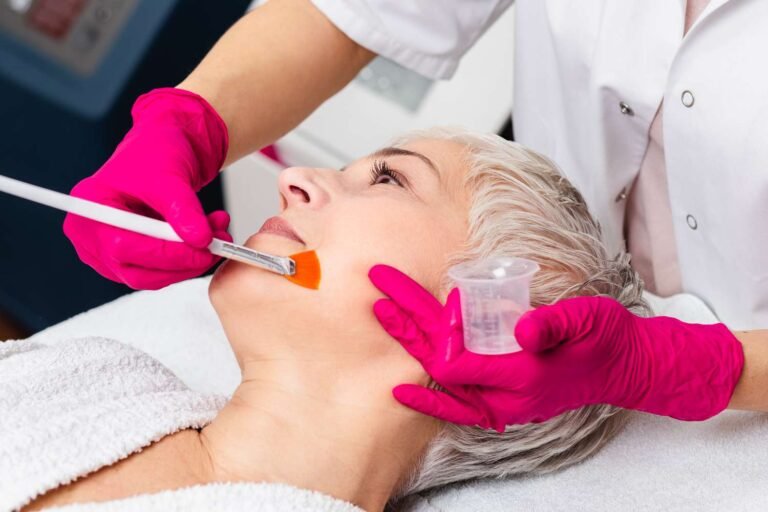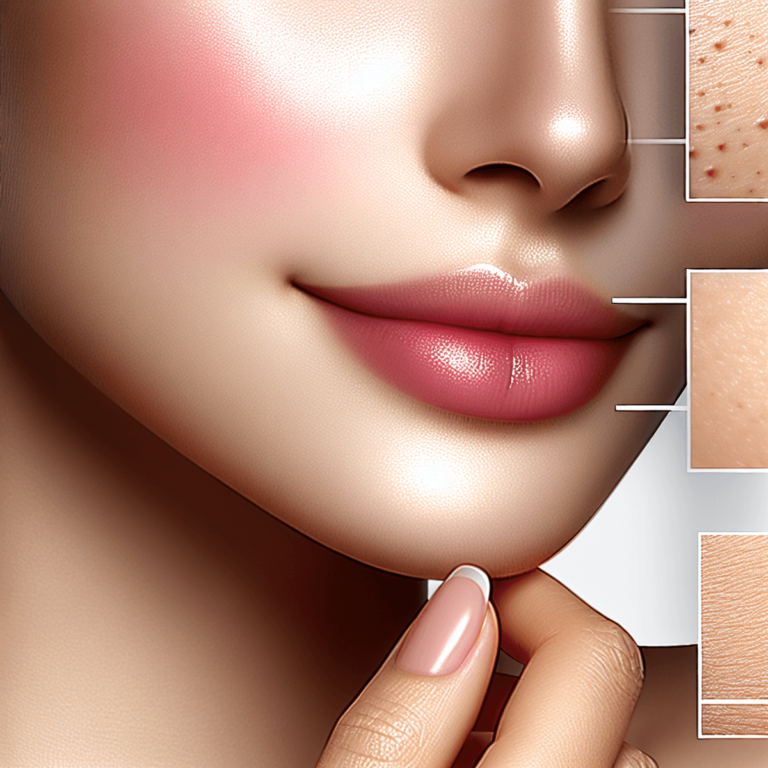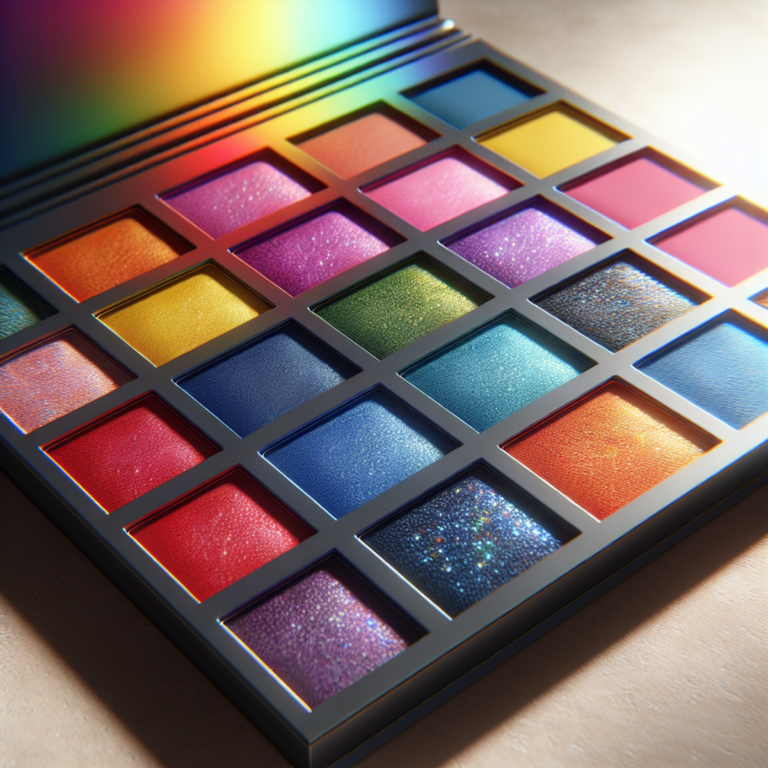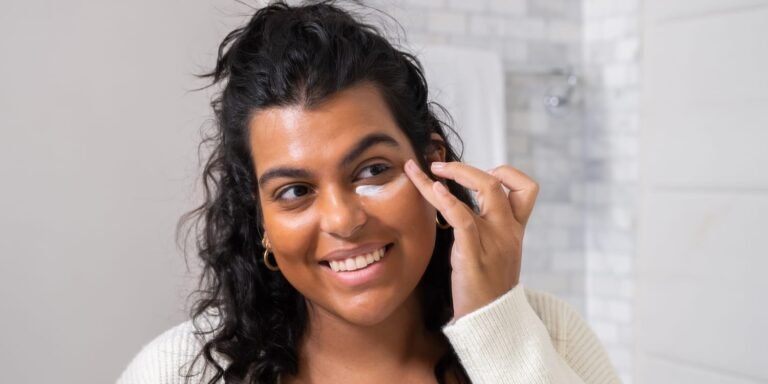Can These New Hair Serums Actually Delay Grays?

Introduction
Hair serums have been making bold claims about their ability to delay the onset of graying hair. This article aims to delve into the effectiveness of these products and their potential impact on delaying or reversing grays.
Talking Points:
- Explanation of the topic: Gray hair is a common concern associated with aging, genetics, and environmental factors. As individuals seek ways to maintain their natural hair color, the market has seen an influx of hair serums promising to address this issue.
- Importance of delaying grays: The perception of gray hair and its association with aging has led many to seek solutions that could potentially help delay its onset. Understanding the significance of maintaining natural hair color is crucial in evaluating the claims made by these hair serums.
- Introduction to hair serums and their claims: Hair serums are formulated with specific ingredients that purportedly target the mechanisms behind graying hair. These products often assert their ability to boost melanin synthesis and improve pigmented compound production, offering a potential solution for individuals looking to manage gray hair.
In this comprehensive discussion, we will explore:
- The science behind graying hair
- The effectiveness of these hair serums
- Lifestyle factors affecting gray hair
- Other potential treatment options
Understanding Gray Hair
Gray hair is a natural part of the aging process, influenced by various factors including genetics, environmental influences, and stress. Here are some key points to consider:
Causes of Gray Hair
The primary cause of gray hair is the reduction in melanin production, the pigment responsible for giving hair its color. As we age, the melanocytes in our hair follicles gradually produce less melanin, leading to the appearance of gray or white hair.
Role of Aging in Graying
Aging is the most common factor contributing to the onset of gray hair. As we grow older, the body undergoes physiological changes that affect melanin production and distribution in the hair.
Genetic and Environmental Factors Influencing Graying
Genetics play a significant role in determining when an individual may start to experience gray hair. Environmental factors such as exposure to pollutants, UV radiation, and certain chemicals can also impact the rate of graying.
Impact of Stress on Hair Color
While it’s a popular belief that stress can cause sudden graying, scientific evidence supporting this claim is limited. However, chronic stress may indirectly affect overall hair health and contribute to premature aging.
Understanding these factors is crucial in evaluating the effectiveness of potential treatments for delaying or reversing gray hair. It provides valuable insights into the complex interplay of biological and environmental elements that influence the color of our hair.
The Science Behind Hair Graying and Melanin Production
The process of hair graying is closely linked to the production of melanin, the pigment responsible for giving hair its color. As we age, there is a gradual decrease in melanin synthesis and pigmented compound production, leading to the appearance of gray or white hair. Let’s delve into the science behind this phenomenon:
1. Melanin Synthesis
Melanocytes, specialized cells located in the hair follicles, are responsible for producing melanin. These cells produce two types of melanin: eumelanin (which provides brown to black color) and pheomelanin (which provides yellow to red color). The ratio of these two pigments determines the hair color.
2. Decline in Melanocyte Activity
As we age, the activity of melanocytes decreases, resulting in reduced melanin synthesis. This decline may be due to various factors, including genetic predisposition and environmental influences.
3. Impact on Pigmented Compound Production
In addition to melanin synthesis, there is a decrease in the production of other pigmented compounds necessary for maintaining hair color. These compounds help distribute melanin throughout the hair shaft, ensuring consistent coloration. A decline in their production can lead to uneven distribution of melanin and the appearance of gray or white hair strands.
4. Genetic Factors
Genetics play a significant role in determining when and how quickly our hair turns gray. Certain genes are associated with premature graying, while others may delay the onset of gray hair.
5. Environmental Influences
External factors such as exposure to UV radiation, pollution, smoking, and certain medications can accelerate the graying process by damaging melanocytes or disrupting melanin production.
Understanding the underlying mechanisms of hair graying and melanin production is crucial in exploring potential strategies for delaying or reversing gray hair. While some hair serums claim to stimulate melanin synthesis and pigmented compound production, it is essential to approach these claims with caution, as scientific evidence supporting their effectiveness is limited. Recent research has shed light on this topic, suggesting that oxidative stress and cellular senescence may also contribute to the graying process.
Examining the Effectiveness of Hair Serums in Delaying Grays
Hair serums have gained popularity as a potential solution for managing gray hair. These products often claim to delay or reverse the graying process by stimulating melanin production and improving overall hair health. While many individuals are eager to find effective treatments for gray hair, the evidence supporting the effectiveness of hair serums in delaying or reversing grays is currently limited.
1. Overview of Hair Serums as a Potential Treatment
Hair serums are formulated with various ingredients designed to nourish and protect the hair. Some products specifically target gray hair by promoting melanin synthesis or providing essential nutrients to support hair health.
2. Limited Evidence Supporting the Claims
Despite the widespread availability of hair serums that claim to address gray hair, there is a lack of substantial scientific evidence to validate these assertions. Clinical studies evaluating the efficacy of these products in delaying graying are relatively scarce.
As consumers continue to seek solutions for managing gray hair, it’s crucial to approach the claims of hair serums with a critical mindset. While these products may offer benefits for overall hair health, their specific impact on delaying grays requires further investigation and substantiation through rigorous research and clinical trials.
The Role of Lifestyle in Gray Hair Prevention
Maintaining a healthy lifestyle can play a significant role in delaying the onset of gray hair. While genetics and aging are primary factors contributing to graying hair, certain lifestyle choices can exacerbate or delay the process. Here are some key lifestyle factors that you can consider to help prevent premature graying:
1. Diet
A nutritious diet rich in vitamins, minerals, and antioxidants can support hair health and potentially delay graying. Including foods such as fruits, vegetables, whole grains, lean proteins, and healthy fats in your daily meals is essential. Specific nutrients like vitamin B12, iron, copper, zinc, and antioxidants like vitamins C and E from these nutrient-rich foods are thought to be beneficial for maintaining hair color.
2. Sleep
Adequate sleep is essential for overall cellular health, including the health of your hair follicles. Lack of sleep can lead to increased stress levels and imbalances in hormone production, which may contribute to premature graying. Aim for 7-9 hours of quality sleep each night to support your hair’s natural pigmentation.
3. Stress Management
Chronic stress can have a negative impact on various aspects of your health, including your hair color. Stress hormones can disrupt melanin production and contribute to oxidative stress, which accelerates graying. Effective stress management techniques, such as meditation, exercise, deep breathing exercises, or engaging in activities you enjoy are crucial in reducing stress levels.
While adopting these lifestyle factors may help delay the onset of gray hair, it’s important to note that they cannot completely prevent it or reverse existing grays. Graying is a natural part of the aging process and is influenced by various factors beyond our control.
By incorporating a balanced diet, sufficient sleep, and effective stress management techniques into your daily routine, you can support the overall health of your hair and potentially slow down the progression of graying. However, it’s essential to remember that genetics and aging are the primary determinants of gray hair, and embracing your natural hair color can be a beautiful and empowering choice.
Understanding Hair Products: Do Hair Serums Really Work?
Hair serums have gained popularity as potential solutions for delaying or reversing gray hair. These products often make bold claims about their ability to restore hair color and prevent further graying. But how do these hair serums work, and do they actually deliver on their promises? Let’s delve into the science behind these claims.
How Hair Serums Work: The Science Behind the Claims
Hair serums are typically formulated with a combination of active ingredients that aim to address the underlying causes of gray hair. While each product may have its unique formulation, most hair serums claim to work in the following ways:
- Melanin Boosting: Melanin is the pigment responsible for hair color, and hair serums often contain ingredients that claim to enhance melanin production. These ingredients include catalase, copper peptides, and certain vitamins like vitamin B5.
- Antioxidant Protection: Free radicals can damage melanocytes, the cells responsible for producing melanin. Hair serums may contain antioxidants like vitamin E or green tea extract, which claim to neutralize free radicals and protect melanocytes from oxidative stress.
- Stimulating Hair Follicles: Some hair serums contain ingredients that aim to stimulate hair follicles and promote healthy hair growth. This can help maintain overall hair health and may indirectly slow down the graying process.
While these mechanisms of action sound promising, it’s important to note that scientific evidence supporting the effectiveness of hair serums in delaying or reversing grays is limited. Most of the claims made by these products are based on anecdotal evidence or small-scale studies with inconclusive results.
It’s also worth mentioning that topical treatments like hair serums face challenges in penetrating the skin to reach the hair follicles’ melanocytes effectively. The absorption rate of these products can vary depending on factors such as the formulation, concentration of active ingredients, and individual differences in skin permeability.
In conclusion, hair serums claim to work by boosting melanin production, providing antioxidant protection, and stimulating hair follicles. However, the scientific evidence supporting their effectiveness in delaying grays is currently limited. It’s important to approach these claims with caution and consult with a dermatologist or trichologist for professional advice on managing gray hair.
Key Ingredients to Look for in Effective Gray Hair Serums
When it comes to finding an effective hair serum for delaying grays, it’s important to look for key ingredients that have the potential to provide benefits. While no product has been proven to definitively reverse gray hair, certain ingredients may help slow down the graying process and improve the overall condition of your hair. Here are some common ingredients found in hair serums that you should consider:
- Antioxidants: Antioxidants play a crucial role in protecting hair follicles from oxidative stress, which can contribute to premature graying. Look for serums that contain antioxidants such as vitamin E, vitamin C, and green tea extract.
- Vitamin B12: Vitamin B12 is essential for melanin production, the pigment responsible for hair color. A deficiency in vitamin B12 can lead to premature graying. Look for serums that include this important vitamin to support melanin synthesis.
- Biotin: Also known as vitamin H, biotin is crucial for maintaining healthy hair and promoting hair growth. It can help strengthen the hair shaft and prevent breakage, which is especially important as gray hairs tend to be more coarse and brittle.
- Peptides: Peptides are short chains of amino acids that can help stimulate new hair growth and improve the overall health of your scalp and hair follicles. They may also help slow down the graying process by supporting the production of melanin.
- Plant extracts: Some plant extracts have been traditionally used to promote hair health and delay graying. Look for ingredients like ginseng extract, horsetail extract, and saw palmetto extract, which are believed to have potential benefits for maintaining natural hair color.
It’s important to note that while these ingredients show promise, their efficacy in delaying grays is still under investigation. Additionally, individual results may vary, and it’s essential to consult with a dermatologist or trichologist for professional advice on managing gray hair. Remember, maintaining overall hair health through a balanced diet, proper sleep, stress management, and avoiding smoking is also crucial in delaying the onset of gray hair.
The Importance of Thorough Testing: Understanding Clinical Trials on Hair Serums for Gray Hair
Hair serums claiming to delay or reverse graying have gained popularity in recent years. However, it is crucial to approach these claims with skepticism and rely on scientific evidence before drawing any conclusions. Rigorous clinical trials are necessary to evaluate the efficacy and safety of hair serums for managing gray hair.
Clinical trials play a vital role in determining the effectiveness of any treatment. They involve a controlled environment where researchers can assess the impact of specific interventions on targeted conditions. When it comes to hair serums for gray hair, clinical trials are essential for several reasons:
- Evaluating Efficacy: Clinical trials provide an objective assessment of whether hair serums can actually delay or reverse graying. They involve comparing the results of using the serum against a control group, often using a placebo. This allows researchers to determine if there is a significant difference between the two groups.
- Ensuring Safety: Clinical trials also help identify any potential side effects or adverse reactions associated with using hair serums. By closely monitoring participants and collecting data on their experiences, researchers can assess the safety profile of these products.
- Determining Optimal Formulations: Clinical trials allow researchers to test different formulations and concentrations of active ingredients in hair serums. This helps optimize the product’s effectiveness by identifying the most promising combinations.
- Establishing Standards: Through clinical trials, researchers can establish standardized protocols for evaluating the efficacy and safety of hair serums. This helps ensure consistency in future studies and comparisons between different products.
It is important to note that while some hair serums may show promising results in initial studies or anecdotal evidence, they still need to undergo rigorous clinical trials to validate their claims. Without proper scientific investigation, it is challenging to determine whether these serums truly deliver the desired results.
Other Potential Treatment Options for Gray Hair
When it comes to managing gray hair, there are several other factors and treatment approaches to consider beyond just using hair serums. These options can help slow down the graying process and promote overall hair health. Here are some key points to explore:
1. UV Protection
- UV exposure has been linked to premature graying of hair. Protecting your hair from the sun’s harmful rays can help delay the onset of gray hair.
- Wear a hat or use products with UV filters when spending time outdoors.
2. Smoking Cessation
- Smoking has been associated with premature graying of hair. Quitting smoking not only improves your overall health but may also help delay the graying process.
3. Address Anemia and Nutritional Deficiencies
- Anemia and poor nutrition, particularly deficiencies in B vitamins, have been linked to premature graying of hair.
- Ensure you have a balanced diet rich in nutrients, including foods like leafy greens, eggs, nuts, and whole grains.
- Consider nutritional supplements if you have specific deficiencies.
4. Thyroid Health
- Untreated thyroid conditions can contribute to premature graying of hair. If you suspect you have a thyroid issue, consult with a healthcare professional for proper diagnosis and treatment.
It’s important to note that these treatment options may help delay the onset of gray hair or slow down the graying process but may not reverse existing gray hairs. Embracing your natural hair color and practicing self-acceptance is also essential in navigating society’s perception of gray hair.
Maintaining Overall Hair Health: Beyond Just Gray Hair Prevention
A healthy hair care routine is essential not only for preventing gray hair but also for maintaining overall hair health. Taking a comprehensive approach to hair care can help address underlying issues and promote strong, lustrous hair. Here are some key points to consider:
- Regular maintenance: Regularly trimming your hair helps prevent split ends and breakage, promoting healthier hair growth. Aim to trim your hair every 6-8 weeks to maintain its vitality.
- Gentle handling: Treat your hair with care by avoiding harsh brushing or combing, especially when it’s wet. Use a wide-toothed comb or a brush with soft bristles to prevent damage and breakage.
- Proper washing: Choose a mild shampoo and conditioner that suits your hair type. Avoid washing your hair too frequently as it can strip away natural oils, leading to dryness. Instead, aim for 2-3 times per week or as needed.
- Deep conditioning: Incorporate deep conditioning treatments into your routine to provide extra nourishment and hydration to your hair. Look for products that contain ingredients like argan oil, shea butter, or keratin for added moisture and strength.
- Protective styling: When styling your hair, opt for protective hairstyles that minimize heat and chemical damage. Avoid excessive use of heat styling tools like straighteners and curling irons, which can weaken the hair shaft over time.
- Healthy diet: A well-balanced diet rich in vitamins and minerals is crucial for maintaining healthy hair. Include foods high in omega-3 fatty acids (such as salmon and walnuts), biotin (found in eggs and almonds), and vitamin E (found in spinach and avocados) to support strong, shiny hair.
- Stress management: Chronic stress can contribute to various hair problems, including premature graying. Practice stress management techniques such as exercise, meditation, or deep breathing to reduce stress levels and promote overall well-being.
Remember, maintaining overall hair health goes beyond just preventing gray hair. By adopting a comprehensive approach to hair care, you can promote strong, vibrant hair that looks and feels its best.
Embracing Gray Hair: Society’s Perception and Self-Acceptance
Society’s perception of gray hair has changed recently. What used to be seen as a sign of getting older is now being accepted as a symbol of knowledge, self-assurance, and genuineness. This change in how society views gray hair is encouraging people to proudly embrace their natural hair color.
The Power of Self-Acceptance
Self-acceptance plays a crucial role in embracing gray hair. By fully accepting and embracing our natural gray hair color, we can experience:
- Greater Confidence: Being comfortable in our own skin, including our hair color, can boost our self-esteem and overall confidence.
- Authenticity: Embracing our gray hair allows us to be true to ourselves and showcase our genuine beauty.
- Breaking Beauty Stereotypes: It challenges the traditional standards of beauty that often prioritize youthfulness and encourages a more inclusive definition of beauty.
- Promoting Diversity: By celebrating different hair colors, including gray, we contribute to a more diverse representation of beauty in the media and society.
Changing Beauty Standards
With more individuals proudly showing off their gray locks, there is a growing movement towards inclusivity in the media and fashion industries. We are now seeing:
- Models with Gray Hair: Fashion runways and advertising campaigns are featuring models with gray hair, representing a wider range of ages and defying age-related stereotypes.
- Public Figures Setting Examples: Influential figures in entertainment, politics, and other fields are embracing their natural hair color, inspiring others to do the same.
- Media Representation: TV shows, movies, and magazines are portraying characters and real-life individuals with gray hair in a positive light, showcasing their beauty and wisdom.
This shift in representation helps break down age-related stereotypes and encourages people of all ages to feel beautiful and confident in their skin.
Embracing Gray Hair as a Statement
Choosing to embrace gray hair goes beyond personal preference; it is a powerful statement that challenges societal norms and promotes the acceptance of natural beauty at every stage of life. It represents:
- Individuality: Each person’s journey with gray hair is unique, and embracing it allows us to celebrate our individuality.
- Cultural Shift: It reflects a broader change in our culture, where people are increasingly valuing authenticity and diversity in all aspects of life, including beauty standards.
By embracing our gray hair, we contribute to this cultural shift and help create a more inclusive society that celebrates the diverse forms of beauty around us. For those who are interested in exploring the topic further, I highly recommend reading this insightful book about going gray: Going Gray.
Final Thoughts
When it comes to delaying grays, the effectiveness of hair serums remains uncertain. While these products claim to boost melanin synthesis and improve pigmented compound production, there is currently a lack of scientific evidence supporting their effectiveness. It’s important to approach these claims with caution and consider other factors that may contribute to gray hair, such as genetics, aging, stress, and lifestyle choices.
While some hair serums may contain ingredients that have the potential to delay graying, it is crucial to consult with a dermatologist or trichologist for professional advice on managing gray hair. These experts can provide personalized recommendations based on your specific hair type and needs.
It’s worth noting that the field of research on gray hair management is continuously evolving, and there is potential for future breakthroughs in this area. As scientists continue to explore new treatment options and conduct rigorous clinical trials, we may gain a better understanding of the efficacy and safety of hair serums in delaying grays.
In the meantime, it’s important to maintain an overall approach to hair health that goes beyond just preventing gray hair. This includes:
- Regular maintenance
- Addressing underlying issues such as nutritional deficiencies or thyroid conditions
- Adopting a healthy lifestyle that includes a balanced diet, sufficient sleep, stress management techniques, and avoidance of smoking
Remember, embracing gray hair is a personal choice, and societal perceptions are changing. Self-acceptance plays a crucial role in our journey towards embracing our natural beauty. So whether you choose to explore different treatment options or embrace your gray strands as they come, the most important thing is to feel confident and comfortable in your own skin.










